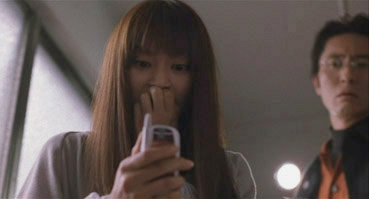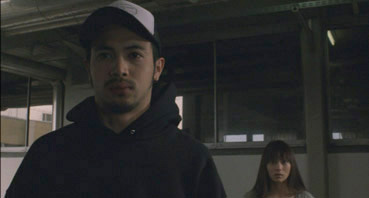|
The ghost of Ringu lives on in One Missed Call [Chakushin ari], a surprisingly conventional horror piece from the insanely prolific Miike Takashi, he of The Black Society Trilogy, Ichi the Killer, Audition and the delirious The Happiness of the Katakuris. A J-horror work in the by-now familiar mould, One Missed Call proficiently recycles elements from a number of sources, but save for a a couple of inventive moments and sly whiff of social commentary, it does little to rise above an already crowded pack.
The central concept is an interesting variation on familiar generic themes. High school student Yoko is understandably rattled when a call made to her mobile phone turns out to be from herself using the very same device, but from two days into the future. It consists of the sound of a railway crossing alarm, followed by an innocuous comment from her other self about it starting to rain and concludes with a horrible scream. Two nights later she is crossing a railway bridge when, just as she remarks on the fact that it is starting to rain, she is pulled onto the railway line and killed by a passing train. Then one of her friends receives a similar call...

J-horror fans will be able to write much of the remaining plot themselves and should even be able to supply some of the imagery, with Ju-on sharing the influence honours with Nakata Hideo's style-setting masterpiece, and even western horrors Final Destination and A Nightmare on Elm Street getting a brief look-in. Many of the components are genre standards, with a group of friends affected in turn by a spiritual force – one that may be the result of a person dying in a state of anger – that attacks them through their technology, and the cause is investigated by a girl who is similarly marked for death unless she can uncover the secret behind the killings, aided by a male outsider with a personal interest in the case.
Characters follow recognisable paths, including the victim whose cynicism about the whole thing sees him almost walk unknowingly to his death, and the terrified girl who accepts offered help but is inevitably clobbered anyway. Phones ring even if they're switched off or deactivated and their ring tones are replaced by a creepy tune could almost be theme music for the movie itself. The malevolent force behind the deaths even has its own instantly identifiable sound, although unlike Ju-on's famous vocal rattle, it's one that later provides a clue to the origins of the curse.
Where the film intermittently comes into its own is in the suggestion that there could be a down side to social networking and that the mobile phone itself – a device on which so many have become almost pathologically dependent (this is especially true of Japan) – could actually prove to be an invasive and ultimately lethal device. Equally intriguing, if a tad heavy-handed, is Live or Die, the TV show on which doomed student Natsumi's trauma and impending death become an entertainment for mass consumption, complete with an excitable reporter, a TV exorcist, and a clock counting down to the moment of her predicted demise.

Which is all well and good. Where One Missed Call trips up, at least for this particular (J-) horror aficionado, is that it isn't particularly scary or – except for a couple of very nicely executed moments – all that unsettling. It's not the handling that's at fault here but the familiarity of the ingredients, paths walked too often by films before and – somewhat unfairly for Miike – since, something the occasional creepy sound effect, camera angle or twisted prosthetic can do little to combat. The sense of uncertainty that made Ringu so unsettling is squashed here at an early stage, with the spirit shown to have a physical power that effectively removes any doubt about the consequences of getting a call. Even the false ending is way too obviously so, as if paying lip service to a narrative structure that all post-Ringu J-horrors are expected to follow.
One Missed Call is still well enough made and (just) strong enough on atmosphere to be of interest to genre devotees, and if you're new to J-horror then you may find it bursting with surprises. It certainly has its fans, not least because of the cult status of its director, with some viewers even claiming that it out-scares Nakata's movie, but I'm having none of that. It's a mildly diverting work nonetheless and apparently wipes the floor with Eric Valette's inevitable American remake, a film whose most shocking quality is generally said to be, well, its shocking quality.
Yet another J-horror arrives on UK DVD looking like it's got on the wrong side of the encoding monster. Although anamorphically enhanced, several of the familiar J-horror transfer giveaways are in evidence, including a muddiness to darker scenes, weak black levels and shadow detail, a green earthy bias to the colour palette, and occasionally visible compression artefacts. At it's best it's not at all bad, but there are a lot of dark scenes here and that's when the transfer is at its weakest. I swear that next time I visit Japan I'm going to try to watch one of these movie on the big screen to see if they all look like this or whether they're transferred to DVD this way before being shipped off to the West.
The 5.1 soundtrack is a different matter, with the sound stage rather well used for ambient sound and music, and an excellent use of the surrounds for a sudden switch of location in the old abandoned hospital (yes, there's one of those too). Sudden, subwoofer-assisted leaps in volume are effectively handled, and there are a couple of very nice bass rumbles.
There's also an English language dub if you want to here how the film would play if it was voiced by the cast of Dawson's Creek.
Promotional Gallery
The original trailer (1:16), 3 promos (0:16. 0:30 and 0:15), the UK trailer (1:24) and 5 TV spots (15-35 secs each) are included and aren't that different to each other. The picture quality matches that of the feature. Live or Die Titles are the nicely done fake opening titles for the in-film TV show.
The Making of One Missed Call (52:10)
A matter-of-fact collection of behind-the-scenes material showing Miike and his team at work, with occasional contributions from Miike and actresses Kou Shibasaki and Kazue Fukiishi. Not bad, but not as compelling as you'd hope.
An engaging enough but derivative J-horror that at least treads its well worn ground efficiently, with a little style and just a dash of subtext. Presumably we can now look forward to the unnecessary sequel Chakushin ari 2 and the spin-off TV series. Premiere Asia's DVD is OK, with the transfer quality no worse than other J-horror imports in recent years, although the making-of documentary is not as substantial as its 52 minute running time suggests.
The Japanese convention of surname first has been used for all Japanese names in this review.
|